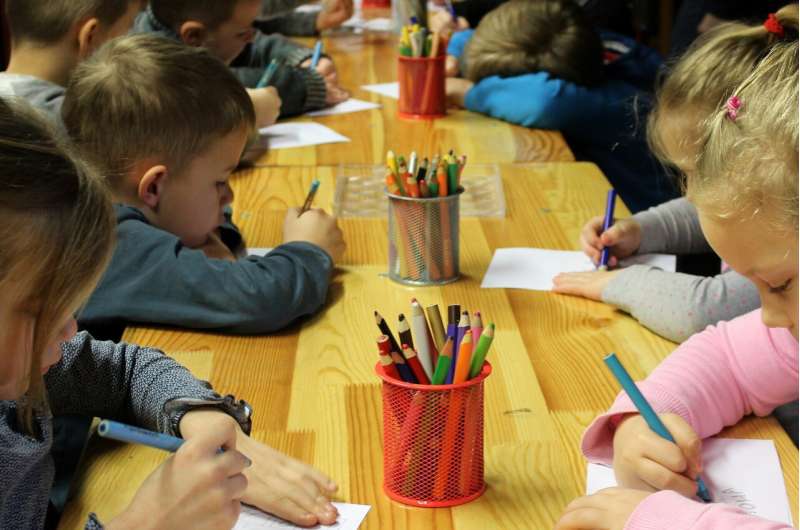COVID delta variant rise looms as K-12 schools prepare to reopen

Infections from the COVID-19 delta variant are rising across the country just as most K-12 schools are preparing to reopen.
Children aged 12 and older can get vaccinated—and nearly 58% of them in America have done so, according to the Centers for Disease Control and Prevention. Many districts have urged educators to be vaccinated, too, to help limit the spread of COVID-19.
Still, cases are expected to surge.
"It's difficult to predict new waves, but a model from the Institute for Health Metrics and Evaluation at the University of Washington shows we may see cases increase until about mid-to-late September. The surge may further accelerate as schools reopen," said Jakub Hlávka, a research assistant professor at the USC Schaeffer Center for Health Policy & Economics.
Nationwide, 40% of American adults 18 and older have yet to be fully vaccinated, well short of the 80% to 100% needed to achieve herd immunity, CDC data show.
How schools—and parents—can limit the spread of the COVID-19 delta variant
What could schools do to create a bubble of vaccinated protection to limit the spread of COVID and its highly transmissible variants?
"We have a very safe, highly effective intervention called vaccination, and we are falling short on making sure that we're really using it. Schools should require workers there to be vaccinated," said Jeffrey Klausner, a clinical professor of population and public health sciences at the Keck School of Medicine of USC.
Parents also have options, he said: They "should send them to places where the people are vaccinated. In general, kids are much less likely to get sick and less likely to have serious complications and be hospitalized or die from COVID, so we can reduce parental anxiety about the consequences."
Even if schools experience an outbreak, they have proven that they can stay open by following the best public health protocols to limit spread, said Rita Burke, an assistant professor of clinical preventive medicine at the Keck School of Medicine.
"Schools have demonstrated that they are able to successfully stay open even when someone tests positive on campus," she said. "They adhere to the contact tracing and quarantine protocols in place that we know are effective."
The shift to distance learning during the first year of COVID is what led many parents—most of them mothers—to struggle considerably during the pandemic shutdown, studies by the Center for Economic and Social Research at the USC Dornsife College of Letters, Arts and Sciences showed.
The struggle was nearly universal. As the first wave of COVID-19 made its way around the world, countries closed their schools, forcing more than 1.5 billion children worldwide to stay at home and sending parents and other caregivers scrambling to ensure their supervision, according to a study last year by the National Bureau of Economic Research.
"We have seen the dire impact of school closures on students and families, and we each need to do our part to ensure that everyone stays safe and healthy," Burke said. "That means getting a vaccine if you are eligible and wearing a mask indoors."
As worldwide COVID cases rise, vaccination mandates may be coming
Vaccination is not just the responsibility of parents and schools.
Karen Mulligan, a fellow at the USC Schaeffer Center, said all employers—regardless of which industry they are in—should consider requiring workers to be vaccinated.
"If employers want to operate reliable in-person workplaces and attract customers, they will have to embrace a solution that the government has so far shied away from: vaccine mandates. Higher education and health care providers are already leading the way," said Mulligan, who also is an assistant professor at the USC Price School of Public Policy.
On Thursday, President Joe Biden announced such a mandate for federal workers, though it may be challenging for him to implement it across the board. Some unions have said such a requirement would have to be discussed during negotiations for new contracts.
Earlier this week, however, the U.S. Department of Veteran Affairs issued such a requirement, following the trend of many hospitals and health care clinics around the country.
The COVID-19 delta variant has provided new impetus for vaccination, even for elected officials who previously had adamantly opposed it. House Minority Whip Steve Scalise was recently vaccinated, though he opposes the CDC's latest recommendation on mask-wearing indoors to reduce the spread.
More people worldwide are getting the vaccine as COVID cases spike. As of Thursday, 69% of U.S. adults have had at least the first of two shots.
The delta variant's rapid and wide transmission offered plenty of impetus, as news coverage of its impact in India was hard to ignore. Photos and video footage of overwhelmed hospitals, weeping and hopeless doctors and nurses, and overflowing makeshift graveyards documented a worst-case scenario: a rapid plague outpacing a nation already overwhelmed and under-resourced—and only just beginning to vaccinate.
"Remember, one person can infect six or seven people," Hlavka said. "You would really have to live under a rock to not be exposed to this virus at some point. And we are only at delta; we are not very far into the Greek alphabet with this virus yet. It's hard to know if we will ever suppress the virus on a global scale."





















